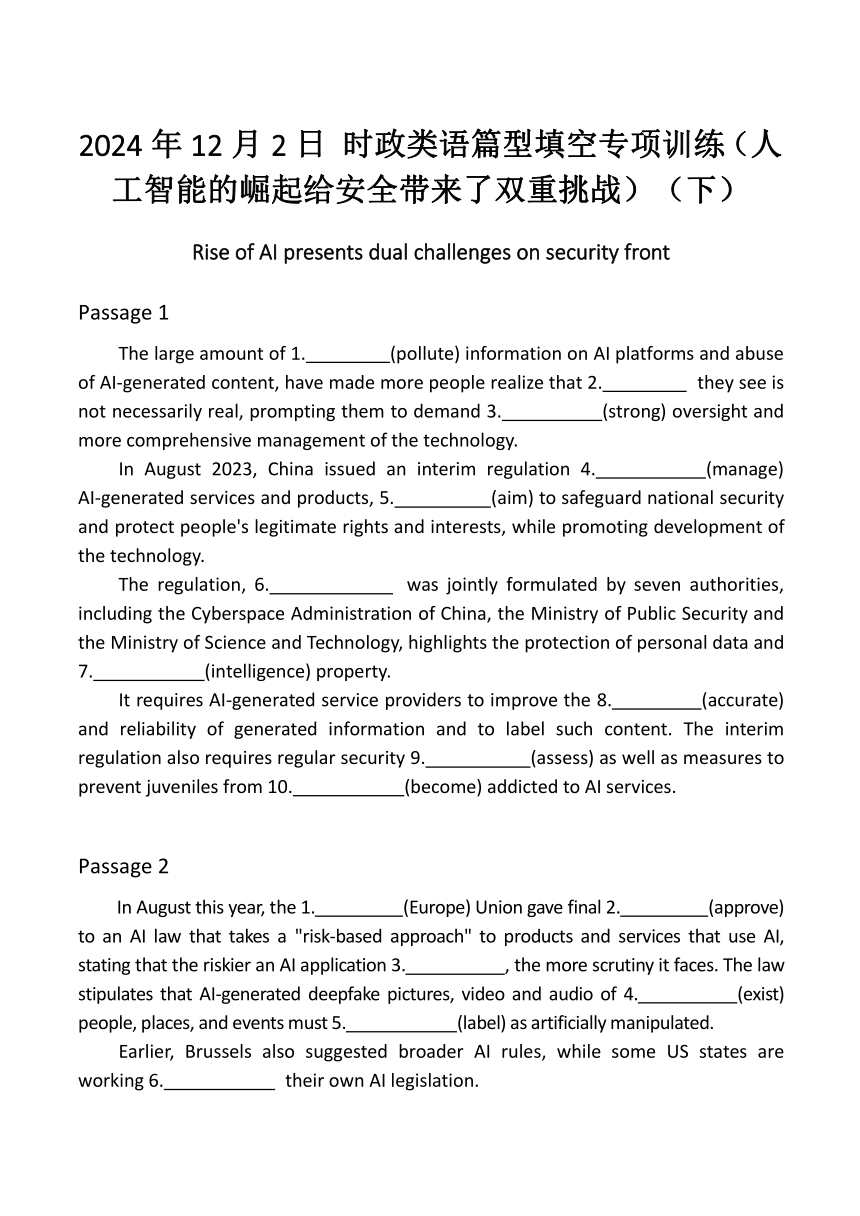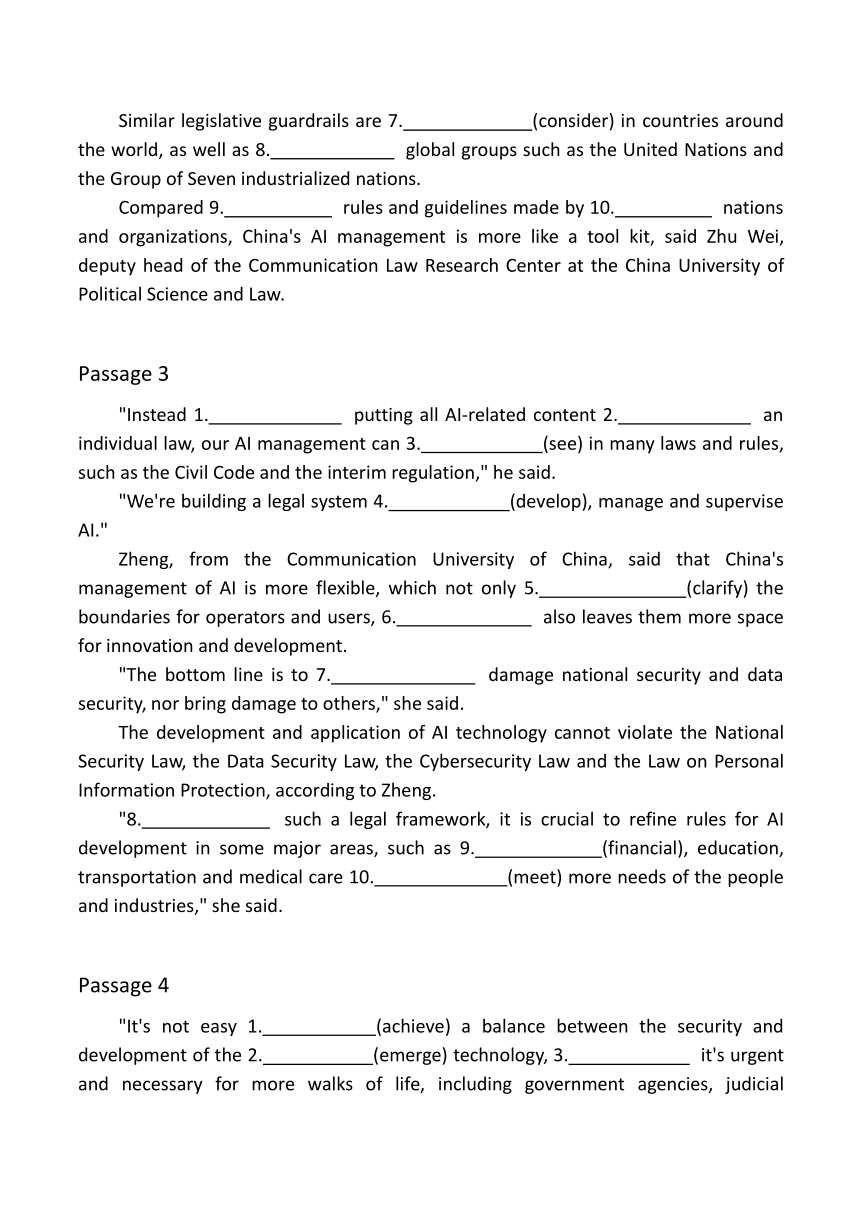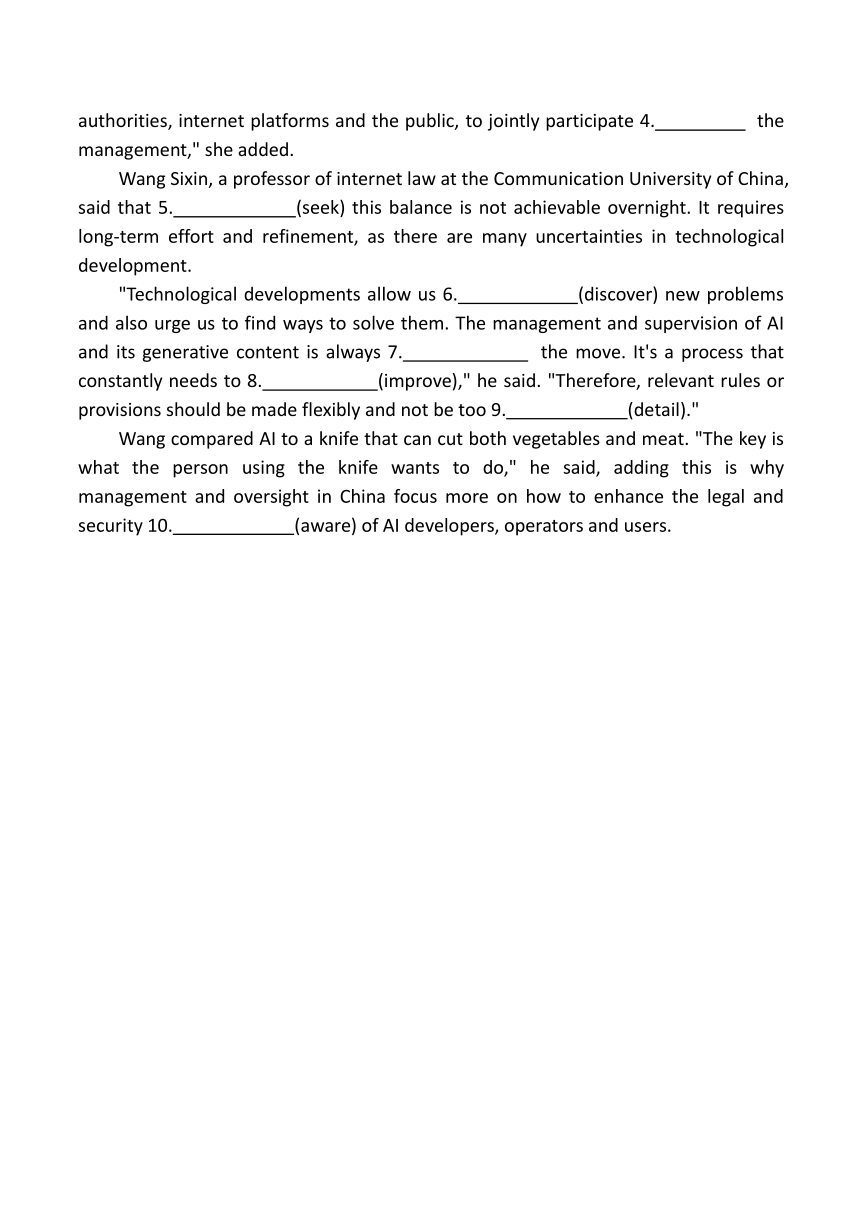2024年12月2日 时政类语篇型填空专项训练(人工智能的崛起给安全带来了双重挑战)(下)-2025届高三上学期英语一轮复习专项
文档属性
| 名称 | 2024年12月2日 时政类语篇型填空专项训练(人工智能的崛起给安全带来了双重挑战)(下)-2025届高三上学期英语一轮复习专项 |  | |
| 格式 | docx | ||
| 文件大小 | 28.4KB | ||
| 资源类型 | 教案 | ||
| 版本资源 | 人教版(2019) | ||
| 科目 | 英语 | ||
| 更新时间 | 2025-02-06 21:35:27 | ||
图片预览



文档简介
2024年12月2日 时政类语篇型填空专项训练(人工智能的崛起给安全带来了双重挑战)(下)
Rise of AI presents dual challenges on security front
Passage 1
The large amount of 1. (pollute) information on AI platforms and abuse of AI-generated content, have made more people realize that 2. they see is not necessarily real, prompting them to demand 3. (strong) oversight and more comprehensive management of the technology.
In August 2023, China issued an interim regulation 4. (manage) AI-generated services and products, 5. (aim) to safeguard national security and protect people's legitimate rights and interests, while promoting development of the technology.
The regulation, 6. was jointly formulated by seven authorities, including the Cyberspace Administration of China, the Ministry of Public Security and the Ministry of Science and Technology, highlights the protection of personal data and 7. (intelligence) property.
It requires AI-generated service providers to improve the 8. (accurate) and reliability of generated information and to label such content. The interim regulation also requires regular security 9. (assess) as well as measures to prevent juveniles from 10. (become) addicted to AI services.
Passage 2
In August this year, the 1. (Europe) Union gave final 2. (approve) to an AI law that takes a "risk-based approach" to products and services that use AI, stating that the riskier an AI application 3. , the more scrutiny it faces. The law stipulates that AI-generated deepfake pictures, video and audio of 4. (exist) people, places, and events must 5. (label) as artificially manipulated.
Earlier, Brussels also suggested broader AI rules, while some US states are working 6. their own AI legislation.
Similar legislative guardrails are 7. (consider) in countries around the world, as well as 8. global groups such as the United Nations and the Group of Seven industrialized nations.
Compared 9. rules and guidelines made by 10. nations and organizations, China's AI management is more like a tool kit, said Zhu Wei, deputy head of the Communication Law Research Center at the China University of Political Science and Law.
Passage 3
"Instead 1. putting all AI-related content 2. an individual law, our AI management can 3. (see) in many laws and rules, such as the Civil Code and the interim regulation," he said.
"We're building a legal system 4. (develop), manage and supervise AI."
Zheng, from the Communication University of China, said that China's management of AI is more flexible, which not only 5. (clarify) the boundaries for operators and users, 6. also leaves them more space for innovation and development.
"The bottom line is to 7. damage national security and data security, nor bring damage to others," she said.
The development and application of AI technology cannot violate the National Security Law, the Data Security Law, the Cybersecurity Law and the Law on Personal Information Protection, according to Zheng.
"8. such a legal framework, it is crucial to refine rules for AI development in some major areas, such as 9. (financial), education, transportation and medical care 10. (meet) more needs of the people and industries," she said.
Passage 4
"It's not easy 1. (achieve) a balance between the security and development of the 2. (emerge) technology, 3. it's urgent and necessary for more walks of life, including government agencies, judicial authorities, internet platforms and the public, to jointly participate 4. the management," she added.
Wang Sixin, a professor of internet law at the Communication University of China, said that 5. (seek) this balance is not achievable overnight. It requires long-term effort and refinement, as there are many uncertainties in technological development.
"Technological developments allow us 6. (discover) new problems and also urge us to find ways to solve them. The management and supervision of AI and its generative content is always 7. the move. It's a process that constantly needs to 8. (improve)," he said. "Therefore, relevant rules or provisions should be made flexibly and not be too 9. (detail)."
Wang compared AI to a knife that can cut both vegetables and meat. "The key is what the person using the knife wants to do," he said, adding this is why management and oversight in China focus more on how to enhance the legal and security 10. (aware) of AI developers, operators and users.
参考答案
参考答案1
1.polluted 2.what 3.stronger 4.to manage 5.aiming
6.which 7.intellectual 8.accuracy 9.assessments 10.becoming
参考译文1
人工智能平台上大量被污染的信息和人工智能生成的内容被滥用,让更多人意识到他们看到的不一定是真实的,这促使他们要求对该技术进行更强有力的监督和更全面的管理。
2023年8月,中国发布了一项临时条例,管理人工智能产生的服务和产品,旨在维护国家安全,保护人民的合法权益,同时促进技术的发展。
该规定由包括中国网络信息办公室、公安部和科技部在内的七个部门联合制定,强调了对个人数据和知识产权的保护。
它要求人工智能生成的服务提供商提高生成信息的准确性和可靠性,并对这些内容进行标记。暂行条例还要求定期进行安全评估,并采取措施防止青少年沉迷于人工智能服务。
参考答案2
1.European 2.approval 3.is 4.existing 5.be labeled
6.on 7.being considered 8.by 9.with 10.other
参考译文2
今年8月,欧盟最终批准了一项人工智能法律,该法律对使用人工智能的产品和服务采取“基于风险的方法”,并指出人工智能应用的风险越大,面临的审查就越多。
该法律规定,人工智能生成的现有人物、地点和事件的深度假图片、视频和音频必须标记为人为操作。
早些时候,布鲁塞尔还提出了更广泛的人工智能规则,而美国的一些州正在制定自己的人工智能立法。
世界各国以及联合国(United Nations)和七国集团(g7)等全球性组织也在考虑设立类似的立法保障。
中国政法大学通信法研究中心副主任朱伟表示,与其他国家和组织制定的规则和指导方针相比,中国的人工智能管理更像是一个工具包。
参考答案3
1.of 2.into 3.be seen 4.to develop 5.clarifies
6.but 7.neither 8.Under 9.finance 10.to meet
参考译文3
他说:“我们没有把所有与人工智能相关的内容都放进单独的法律中,而是在许多法律法规中看到了我们对人工智能的管理,比如《民法典》和暂行条例。”
“我们正在建立一个法律体系来开发、管理和监督人工智能。”
来自中国传媒大学的郑表示,中国对人工智能的管理更加灵活,这不仅为运营商和用户明确了界限,也为他们留下了更多的创新和发展空间。
她说:“底线是既不损害国家安全和数据安全,也不给他人带来损害。”
人工智能技术的发展和应用不能违反《国家安全法》、《数据安全法》、《网络安全法》和《个人信息保护法》。
她说:“在这样一个法律框架下,在金融、教育、交通和医疗等一些主要领域完善人工智能发展规则,以满足人民和行业的更多需求,是至关重要的。”
参考答案4
1.to achieve 2.emerging 3.so 4.in 5.seeking
6.to discover 7.on 8.be improved 9.detailed 10.awareness
参考译文4
她补充说:“在安全和新兴技术的发展之间取得平衡并不容易,因此迫切需要包括政府机构、司法机关、互联网平台和公众在内的更多行业共同参与管理。”
中国传媒大学互联网法学教授王思新表示,寻求这种平衡不是一朝一夕就能实现的。这需要长期的努力和完善,因为技术发展中存在许多不确定因素。
他说:“技术的发展使我们能够发现新问题,也促使我们找到解决这些问题的方法。”
“对人工智能及其生成内容的管理和监督总是在不断变化。这是一个需要不断改进的过程,”他说。“因此,相关规则或规定应灵活制定,不要过于详细。”
王将人工智能比作一把既能切菜又能切肉的刀。他说:“关键是用刀的人想要做什么。”他补充说,这就是为什么中国的管理和监督更多地关注如何提高人工智能开发者、运营商和用户的法律和安全意识。
Rise of AI presents dual challenges on security front
Passage 1
The large amount of 1. (pollute) information on AI platforms and abuse of AI-generated content, have made more people realize that 2. they see is not necessarily real, prompting them to demand 3. (strong) oversight and more comprehensive management of the technology.
In August 2023, China issued an interim regulation 4. (manage) AI-generated services and products, 5. (aim) to safeguard national security and protect people's legitimate rights and interests, while promoting development of the technology.
The regulation, 6. was jointly formulated by seven authorities, including the Cyberspace Administration of China, the Ministry of Public Security and the Ministry of Science and Technology, highlights the protection of personal data and 7. (intelligence) property.
It requires AI-generated service providers to improve the 8. (accurate) and reliability of generated information and to label such content. The interim regulation also requires regular security 9. (assess) as well as measures to prevent juveniles from 10. (become) addicted to AI services.
Passage 2
In August this year, the 1. (Europe) Union gave final 2. (approve) to an AI law that takes a "risk-based approach" to products and services that use AI, stating that the riskier an AI application 3. , the more scrutiny it faces. The law stipulates that AI-generated deepfake pictures, video and audio of 4. (exist) people, places, and events must 5. (label) as artificially manipulated.
Earlier, Brussels also suggested broader AI rules, while some US states are working 6. their own AI legislation.
Similar legislative guardrails are 7. (consider) in countries around the world, as well as 8. global groups such as the United Nations and the Group of Seven industrialized nations.
Compared 9. rules and guidelines made by 10. nations and organizations, China's AI management is more like a tool kit, said Zhu Wei, deputy head of the Communication Law Research Center at the China University of Political Science and Law.
Passage 3
"Instead 1. putting all AI-related content 2. an individual law, our AI management can 3. (see) in many laws and rules, such as the Civil Code and the interim regulation," he said.
"We're building a legal system 4. (develop), manage and supervise AI."
Zheng, from the Communication University of China, said that China's management of AI is more flexible, which not only 5. (clarify) the boundaries for operators and users, 6. also leaves them more space for innovation and development.
"The bottom line is to 7. damage national security and data security, nor bring damage to others," she said.
The development and application of AI technology cannot violate the National Security Law, the Data Security Law, the Cybersecurity Law and the Law on Personal Information Protection, according to Zheng.
"8. such a legal framework, it is crucial to refine rules for AI development in some major areas, such as 9. (financial), education, transportation and medical care 10. (meet) more needs of the people and industries," she said.
Passage 4
"It's not easy 1. (achieve) a balance between the security and development of the 2. (emerge) technology, 3. it's urgent and necessary for more walks of life, including government agencies, judicial authorities, internet platforms and the public, to jointly participate 4. the management," she added.
Wang Sixin, a professor of internet law at the Communication University of China, said that 5. (seek) this balance is not achievable overnight. It requires long-term effort and refinement, as there are many uncertainties in technological development.
"Technological developments allow us 6. (discover) new problems and also urge us to find ways to solve them. The management and supervision of AI and its generative content is always 7. the move. It's a process that constantly needs to 8. (improve)," he said. "Therefore, relevant rules or provisions should be made flexibly and not be too 9. (detail)."
Wang compared AI to a knife that can cut both vegetables and meat. "The key is what the person using the knife wants to do," he said, adding this is why management and oversight in China focus more on how to enhance the legal and security 10. (aware) of AI developers, operators and users.
参考答案
参考答案1
1.polluted 2.what 3.stronger 4.to manage 5.aiming
6.which 7.intellectual 8.accuracy 9.assessments 10.becoming
参考译文1
人工智能平台上大量被污染的信息和人工智能生成的内容被滥用,让更多人意识到他们看到的不一定是真实的,这促使他们要求对该技术进行更强有力的监督和更全面的管理。
2023年8月,中国发布了一项临时条例,管理人工智能产生的服务和产品,旨在维护国家安全,保护人民的合法权益,同时促进技术的发展。
该规定由包括中国网络信息办公室、公安部和科技部在内的七个部门联合制定,强调了对个人数据和知识产权的保护。
它要求人工智能生成的服务提供商提高生成信息的准确性和可靠性,并对这些内容进行标记。暂行条例还要求定期进行安全评估,并采取措施防止青少年沉迷于人工智能服务。
参考答案2
1.European 2.approval 3.is 4.existing 5.be labeled
6.on 7.being considered 8.by 9.with 10.other
参考译文2
今年8月,欧盟最终批准了一项人工智能法律,该法律对使用人工智能的产品和服务采取“基于风险的方法”,并指出人工智能应用的风险越大,面临的审查就越多。
该法律规定,人工智能生成的现有人物、地点和事件的深度假图片、视频和音频必须标记为人为操作。
早些时候,布鲁塞尔还提出了更广泛的人工智能规则,而美国的一些州正在制定自己的人工智能立法。
世界各国以及联合国(United Nations)和七国集团(g7)等全球性组织也在考虑设立类似的立法保障。
中国政法大学通信法研究中心副主任朱伟表示,与其他国家和组织制定的规则和指导方针相比,中国的人工智能管理更像是一个工具包。
参考答案3
1.of 2.into 3.be seen 4.to develop 5.clarifies
6.but 7.neither 8.Under 9.finance 10.to meet
参考译文3
他说:“我们没有把所有与人工智能相关的内容都放进单独的法律中,而是在许多法律法规中看到了我们对人工智能的管理,比如《民法典》和暂行条例。”
“我们正在建立一个法律体系来开发、管理和监督人工智能。”
来自中国传媒大学的郑表示,中国对人工智能的管理更加灵活,这不仅为运营商和用户明确了界限,也为他们留下了更多的创新和发展空间。
她说:“底线是既不损害国家安全和数据安全,也不给他人带来损害。”
人工智能技术的发展和应用不能违反《国家安全法》、《数据安全法》、《网络安全法》和《个人信息保护法》。
她说:“在这样一个法律框架下,在金融、教育、交通和医疗等一些主要领域完善人工智能发展规则,以满足人民和行业的更多需求,是至关重要的。”
参考答案4
1.to achieve 2.emerging 3.so 4.in 5.seeking
6.to discover 7.on 8.be improved 9.detailed 10.awareness
参考译文4
她补充说:“在安全和新兴技术的发展之间取得平衡并不容易,因此迫切需要包括政府机构、司法机关、互联网平台和公众在内的更多行业共同参与管理。”
中国传媒大学互联网法学教授王思新表示,寻求这种平衡不是一朝一夕就能实现的。这需要长期的努力和完善,因为技术发展中存在许多不确定因素。
他说:“技术的发展使我们能够发现新问题,也促使我们找到解决这些问题的方法。”
“对人工智能及其生成内容的管理和监督总是在不断变化。这是一个需要不断改进的过程,”他说。“因此,相关规则或规定应灵活制定,不要过于详细。”
王将人工智能比作一把既能切菜又能切肉的刀。他说:“关键是用刀的人想要做什么。”他补充说,这就是为什么中国的管理和监督更多地关注如何提高人工智能开发者、运营商和用户的法律和安全意识。
同课章节目录
